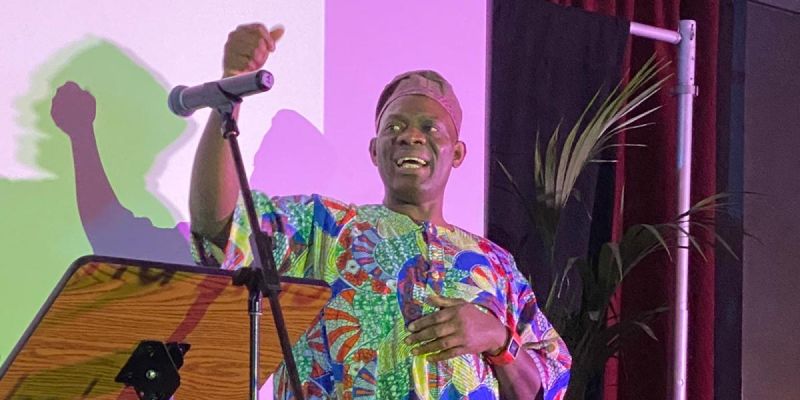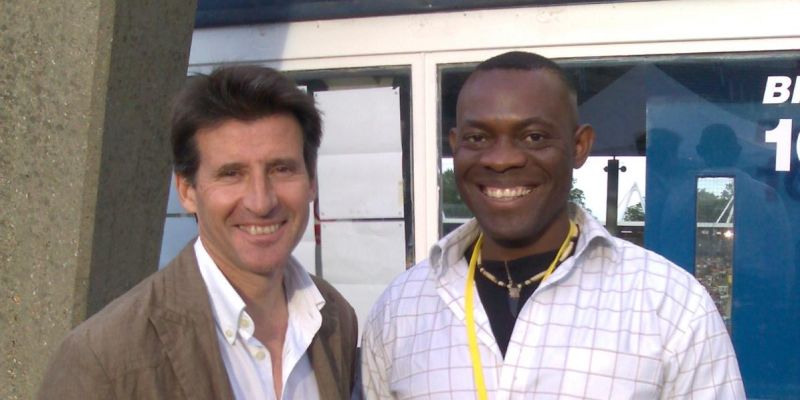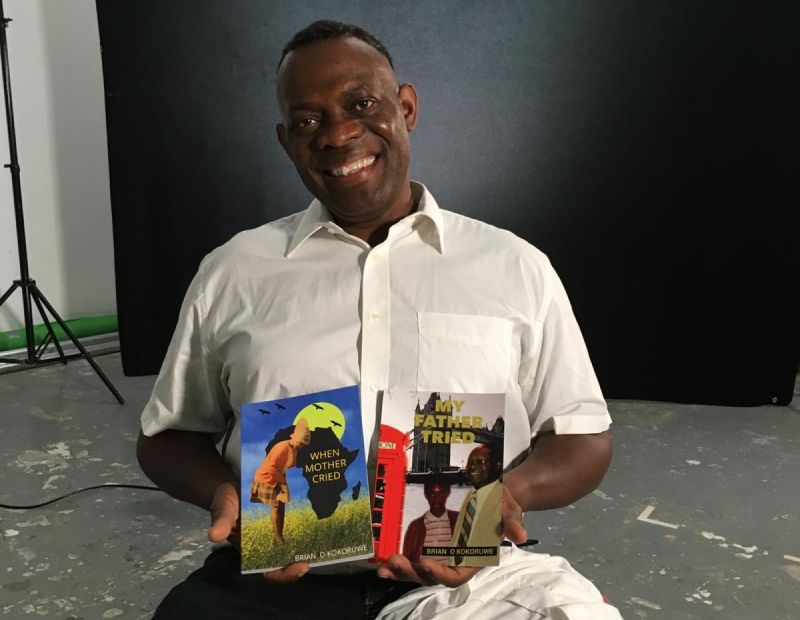
A life-changing meningitis infection didn't stop Brian Kokoruwe (MA Education 2014) pursuing his dreams of sporting success.
At the age of 13, the disease left him unable to walk and with profound hearing loss. With a determination to realise his dream of becoming an athlete, he moved from Nigeria to London to receive treatment.
Now, he’s about to release the third instalment of his autobiography.
Brian tells us about his achievements for Team GB on the track and beyond, the barriers he’s faced as a deaf person in the UK, and the role he now plays as an advocate for the community.
What are your memories of growing up in Nigeria?
I was born in London, but my parents felt it was more appropriate when I was three months old to put me on a plane alone to travel to Nigeria under the watchful eyes of the cabin crew. I was raised by my grandparents in a small village until after the civil war when my parents returned to Nigeria.
Village life was simple, uncomplicated and fun – things were very traditional, with no electricity or running water indoors.
But things changed when you turned 13.
That’s right. While at boarding school, I was infected with meningitis which left me temporarily unable to walk and resulted in profound hearing loss. I was devastated. My father tried all he could to find treatment, at first in Nigeria, then eventually in London.
That must have been a very challenging time.
I lost hope. Before my diagnosis, I dreamed of a career in sport, and I wondered if there was any point continuing with life. But my parents had faith in my ability, encouraged me to take things one day at a time and to do my best.
Through determination, physiotherapy and above all my faith in God, I regained the ability to walk, then run.
How did you communicate with friends and family following your profound hearing loss?
Before I became deaf, I’d never met a deaf person or seen anyone using sign language. My family didn’t have any knowledge of deafness or sign language either, so at home I spoke and used lip reading.
When I was placed in a partial hearing unit at school, sign language wasn’t allowed, so after school when I was introduced to a deaf club, I was shocked to see deaf people signing. I thought learning to sign would be really hard so I didn’t learn until after my first degree.
Now, with my deaf friends, I sign in whichever sign language they prefer – I can now use British Sign Language, Sign Supported English and International Sign Language too.
How do you think your hearing loss impacted your career?
I struggled to find people to look up to because of a lack of Deaf Role Models. I had no clear educational and career pathway. It was not helpful that educational bodies and employers did not have much deaf awareness either, so I was constantly facing barrier after barrier.
Despite having the necessary qualifications for universities, I was rejected by three out of four. Then, after successfully achieving my first degree, employers did not want to offer me graduate level jobs, but basic school leaver roles instead. I tried and tried and finally got employment opportunities in fashion and legal areas, then in the City working at different banks.
Your ability to walk and then run again reignited your dreams of athletics success. Tell us about that.
I captained my school athletics team, and although I did well against hearing competitors, I lost vital seconds at the start of a race from not being able to hear the starting pistol.
After finding a poster for a GB deaf athletics training weekend, I went along. I went on to win a couple of regional and national competitions and was picked to represent GB in both the 200m and 400m at the European Deaf Athletics Championships and at the Deaflympics. I narrowly missed out on a medal but I was pleased to assist the GB team to a bronze medal at the 400 metre relay at the Deaflympics.

How have you helped other deaf athletes along the way?
I wanted to give opportunities to deaf athletes that I didn’t get when I was training and competing.
My biggest disadvantage in those days was that I didn’t have a professional deaf advisor in the areas of sports development. I became a qualified fitness instructor as well as a sprint coach, so I could offer top quality advice to deaf athletes using sign language. I was really excited to see my athletes winning medals and giving their best professionally.
After retiring from athletics, I set up an organisation, Deaf UK Athletics, to nurture and develop deaf athletes to represent GB. Some of these athletes went on to win European championships and Deaflympics medals and also achieved deaf athletics world records.
I was also picked to be the Assistant Technical Director for Athletics and Cross Country in the European Deaf Sports Organisation.
What brought you to Leeds?
I worked as a sensory and physical disabilities team leader at a college at the time, and I knew Leeds had an excellent reputation for deaf education and developing high calibre teachers of the deaf. I wanted to join for my own development. I had stayed at Leeds a couple of times for social events as well as for nearby athletics competitions and loved the city, so I enrolled.
My course covered issues ranging from diagnosing childhood hearing loss, methods of educating deaf children, and technologies utilised in the classroom by deaf students and their teachers.
Tell us about the work that followed.
Due to the discriminatory practices that I’ve experienced, I set up Deafinitequality to offer advice and training relating to equality for deaf people. I also volunteer my time for the National Deaf Children Society as a Deaf Role Model where I share my life experiences with parents of newly deaf children, to give them encouragement and hope for their deaf child.
Having had lived experience of the hearing world and now being deaf, I am ideally suited to deliver deaf awareness training to organisations across the country. Additionally, I travel around the country giving keynote speeches to a wide range of organisations and at different functions.
And now you’ve completed three books?

I thought it would be a good idea to share my life journey in the hope that it might encourage others to follow their dreams. From that came two books and now the third one is almost ready to be released.
Book one, When Mother Cried, covers my account from birth through to when my parents had to put me alone in a plane under the watchful eyes of the cabin crews to travel from London to Lagos, Nigeria at only three months old. It explains about growing up with my grandparents and how I rejected my mother on her return to Nigeria.
Book two, My Father Tried, is the follow up to When Mother Cried and explains how my life changed following my meningitis infection. My father explored all available avenues to try to reverse my situation and brought me back to the country of my birth.
Watch for book three to be released in March. My books are available from the Brian Kokoruwe website.
For further details, email Ed Newbould, Digital Communications Officer, University of Leeds at e.w.newbould@leeds.ac.uk.